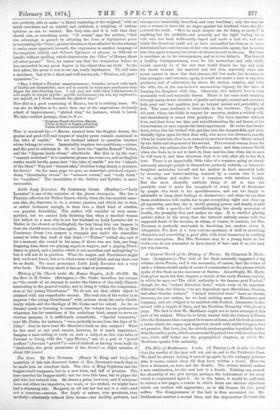Too Late. By Mrs. Newman. (Henry S. King and Co.)—The
materials of this tale deserved better of Mrs. Nowman's hands than to be made into an overdone hash. The idea of King Cophetua and the beggar-maid reappears, but in a new form, and full of promise. The hero marries his beggar-maid ; not for love this time, but to pique the girl who has refused him. He draws a prize, however, and if everyone were not either too impulsive, too weak, or too wicked, we might have had a charming tale. Margaret, in all but her last act, is a real—and not a common—success. Her depth of nature, trite greatness, true modesty—absolutely without false shame—her docility, patience, and courage are beautifully described, and very touching ; only she was too true a woman to have felt no anger against her husband when she dis- covered the fruth. "How he must despise me for being so ready l" is anything but the probable, and certainly not the right feeling for a wife who has been deliberately duped and made a tool of; and cer- tainly the discovery could not so have intensified her love as to have determined her—not because of her own unbearable agony, but to make him free again to marry her rival—to drown herself in the sea. Her love is overdone as to its consequences, and so is her father's. Tho love of a healthy Coastguardsman, even for his motherless and only child. would scarcely be of the sort that would blanch his lips and thin his cheek because she married and left him, especially since she never ceased to show him that absence did but make her devotion to him stronger ; and certainly, again, it would not make a man of superior goodness, and of cultivation far above his station, connive, and with the wife, too, at his son-in-law's unconscious bigamy, for the sake of keeping his daughter with him. Otherwise this father's love is very unusually well and naturally drawn. There is the same fault running through many clever sketches of gentle and simple, master and servant ; both good and bad qualities just go beyond nature and probability at last. The same tendency is observable in the incidents. The gentle old aunt, whose one foible is respect for ancestry, makes a wicked will, and immediately is seized with paralysis. The hero marries without love, and then loves too late, and notwithstanding the sad lesson of his bereavement, at once repeats the fatal experiment. He twice has brain- fever, twice lets his wicked wife get him into the deepest debt, and acci- dentally lights upon his first dear wife, who never was drowned, exactly when he wants her, that is, as soon as he recovers from the illness caused by the debts and elopement of his second. This wicked woman loves Sir Frederick, but refuses him for Nevill's money ; and then refuses Nevin when she finds he is not to have it, then marries him when she is sure he will have it, and then discovers that it is left, after all, to her first love. There is an improbable little rider of a romance going on simul- taneously amongst people in themselves perfectly natural,—a baronet's daughter maintains herself and her mother in their ancestral halls by farming and butter-making, assisted by a cousin who is heir to an earldom and makes her a countess with fabulous wealth. But the most absurdly unlikely thing of all is that the paralytic aunt is made the receptacle of every kind of disclosure by people who trust in her speechlessness, and are too happy or miserable to keep their feelings to themselves ; and when we see that these confidences will enable her to put everything right and clear up all mysteries, and that she is slowly gaining power, and finally is able to write with a pencil,—lo ! notwithstanding har steady accession of health, she promptly dies and makes no sign. It is another glaring artistic defect in the story, that the interest entirely ceases with the supposed death of the heroine, in whom, of course, it centres; for Mrs. Newman is perfectly successful in deceiving her readers about it. Altogether, Too Late is a very curious specimen of skill in sketching character, and conceiving a good plot, with total nnsuccess in working out the conception. But Mrs. Newman may be a young hand at her work—we do not remember to have heard of her—and if so, she may yet win renown.


































 Previous page
Previous page